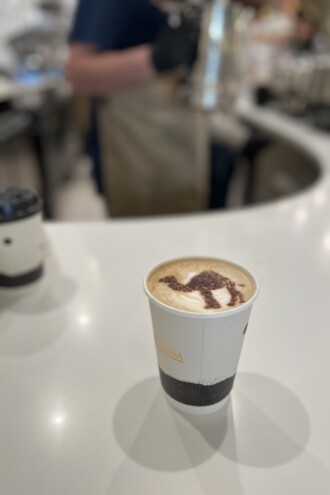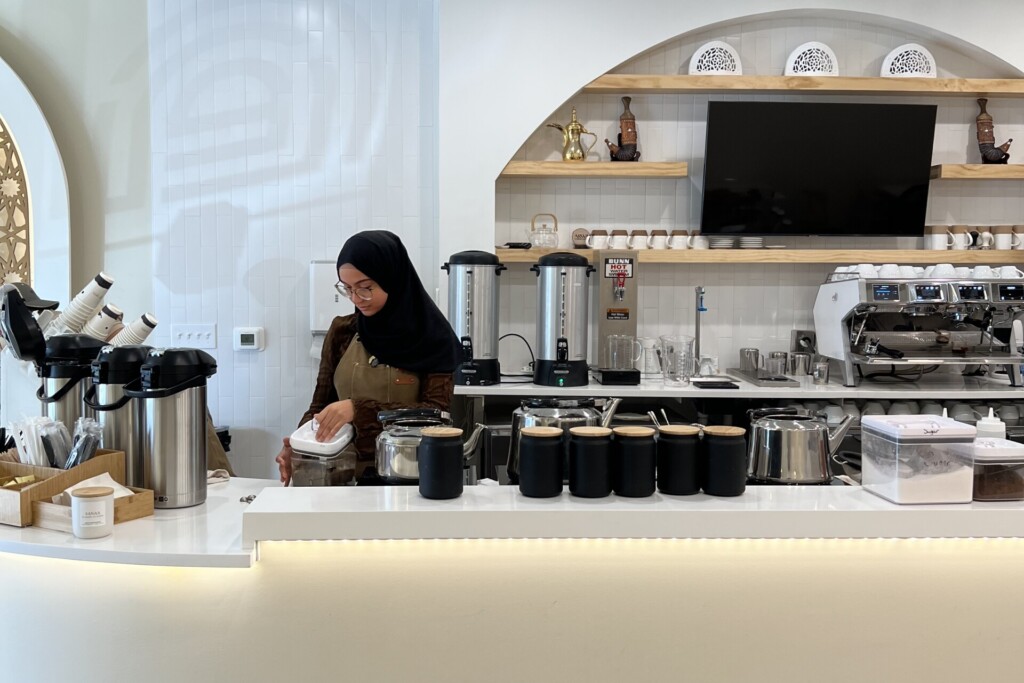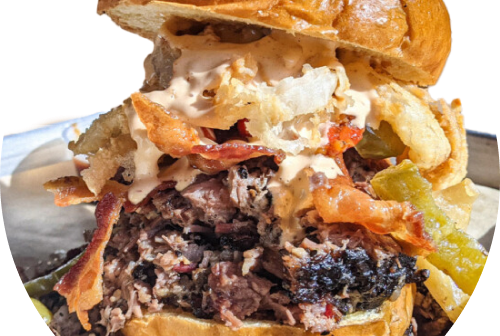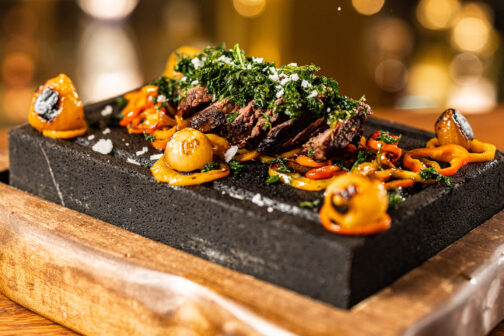At Arwa, North Texas’ first Yemeni coffee shop, muted stone-colored walls and handmade light fixtures feel like stepping into a modern yet historical space. A large 25,000 marble piece mosaic hangs on a bare wall, displaying the old city of Sana’a. Tucked in the corner is a wooden bookcase filled with books about the country. The space—and the lingering coffee aroma—is inviting.
“We were purposeful about everything,” says co-founder Susan Shihab. “We want to do our country justice.”
Arwa has been busy since its December 2022 debut. Within four minutes of opening on a recent weekend, Arwa was filled with a buzzy atmosphere and a diverse group of students, families, and friends lining up to savor a cup of coffee. But not just any kind; Yemen is the country where coffee was first cultivated, and Yemeni coffee differentiates from a regular cup of American or Colombian coffee.
The traditional coffee bean is grown a handful of times a year and is naturally dried by the sun at an elevation of over 2,000 meters (about 6,561 feet). This gives a natural aroma of chocolate undertones with a fruity and citrus flavor.
“We have such a strong, rich history in the actual cultivation of coffee,” says co-founder Yazan Soofi. “Yemen was the first country to brew it and a lot of people don’t know that.”
That’s why Soofi, his wife, Shihab, his sister, Nora Soofi, and brother-in-law Faris Almatrahi founded Arwa. Though they all have full-time jobs, they wanted to bring their history to North Texas. As a majority female-owned shop, they pay respect to Queen Arwa, who helped Yemeni people flourish socially and economically. It’s what they want their coffee shop to do: inspire a community.

“Coffee, regardless of what culture or region, is in itself a community,” Nora says. “It’s a lighting that unites people through a common cup, a common space, where you sit and discuss everyday life issues.”
From fragrant Adeni chai to rich Yemeni lattes, the shop has attracted a community of support. Arwa’s founders have noticed how people unaware of the history of Yemen leave with a newfound appreciation and taste for coffee.
“People are so eager to try something authentic that they’ve never had access to before,” Shihab says. That’s part of why we did this. It’s exciting for us to have people want to learn more.”
Arwa doesn’t stand alone. Yemeni coffee shops are consecutively opening up in North Texas: Qamaria, a Michigan-based coffee shop chain, opened February in Mansfield.
Their drinks are named after places in Yemen. From Marib, a medium roast coffee with cardamom, to Juban, a coffee and cascara blend with cardamom, ginger, and cinnamon. Pastries include khaliat nahal, a sweet honeycomb-like bread filled with cream cheese, drizzled with honey, and sprinkled with sesame seeds. Although the menu includes smoothies, Qamaria doesn’t sell decaf coffee. This requires processing that dilutes the authenticity of beans, says franchise owner Ibrahim Adam.
“We avoid the chemicals used in the processing of decaffeinated beans,” Adam says. For something with less caffeine, he recommends a lighter five percent caffeine Yemeni drink called Sheeba, which contains antioxidants.
Adam comes from a background in social work. He was already in a mindset of wanting to help others and wanted to venture out. “I sat down with the owner of Qamaria and he explained his goals,” Adam says.
They both shared the idea that coffee offers a space for families and friends to come together and connect. It’s what he witnesses every day in the shop.
“When you look around you see a mother and her son or you see friends,” Adam says. “Qamaria means this area where people and families come together and enjoy a cup of coffee while reconnecting. They’re able to nurture a bond.”
Adam prides Qamaria on having a selfless mission and plans to host charity events at the coffee shop for artists to put up their artwork to auction off. All the proceeds will be donated to charity, he says. The growing coffee chain has eight locations scattered throughout Michigan, Ohio, Illinois, and Texas.
This drive to revive a culture is what Hamzah Nasser wanted to accomplish by selling Yemeni coffee beans in 2019, but he found no buyers. He did the only thing he could think of: he opened a coffee shop. Two hours before opening his first Haraz Coffee House location in Dearborn, Michigan, the parking lot was full.
Haraz is named after a mountainous village in Yemen that opened the first Arabica coffee school in the world and is making its mark across the country. Nasser plans to open 21 locations in the next year, including five in the Dallas area. The shop’s first Texas location was in Sugar Land, and the East Plano location—Haraz’s first in North Texas—is set to open in April.
Initially, he didn’t plan on opening more coffee shops outside of Michigan. “But, every day, our customer base grew,” Nasser says. “People wanted a Haraz in their city.”
It’s a similar buzz to how customers line up outside Arwa or drive to Mansfield for Qamaria. What began as a thirst for Yemeni people to honor their heritage has naturally drawn a connection with the community and a new understanding of coffee.
“I love what I’m doing now. It’s so fun,” Nasser says. “I get something every time I open a coffee shop; I make more friends and I become part of a new community.”
Arwa Yemeni Coffee, 888 S. Greenville Ave., Ste. 223, Richardson; Qamaria Coffee House, 1601 E Debbie Ln. Ste. 111, Mansfield.; Haraz Coffee House, 4301 14th St., Plano.
Author







